Philosophy of Nursing and Values: Exploring Metaparadigm Concepts
VerifiedAdded on 2022/08/15
|5
|1039
|13
Essay
AI Summary
This paper delves into the philosophy of nursing, emphasizing the crucial role of personal and professional values in healthcare. It begins by defining a personal philosophy of nursing as a framework of beliefs, values, and ethics that guide caregiving. The paper then explores the metaparadigm of nursing, encompassing nursing, person, environment, and health, and provides clinical examples of how these concepts manifest in practice. The author identifies and clarifies key values such as caring, achievement, and family, demonstrating their impact on patient care and nurse-patient relationships. The importance of professional values, as outlined in the ANA Code of Ethics, is discussed, highlighting their role in critical thinking and ethical practice. The conclusion underscores the significance of a well-defined nursing philosophy in providing high-quality, patient-centered care.
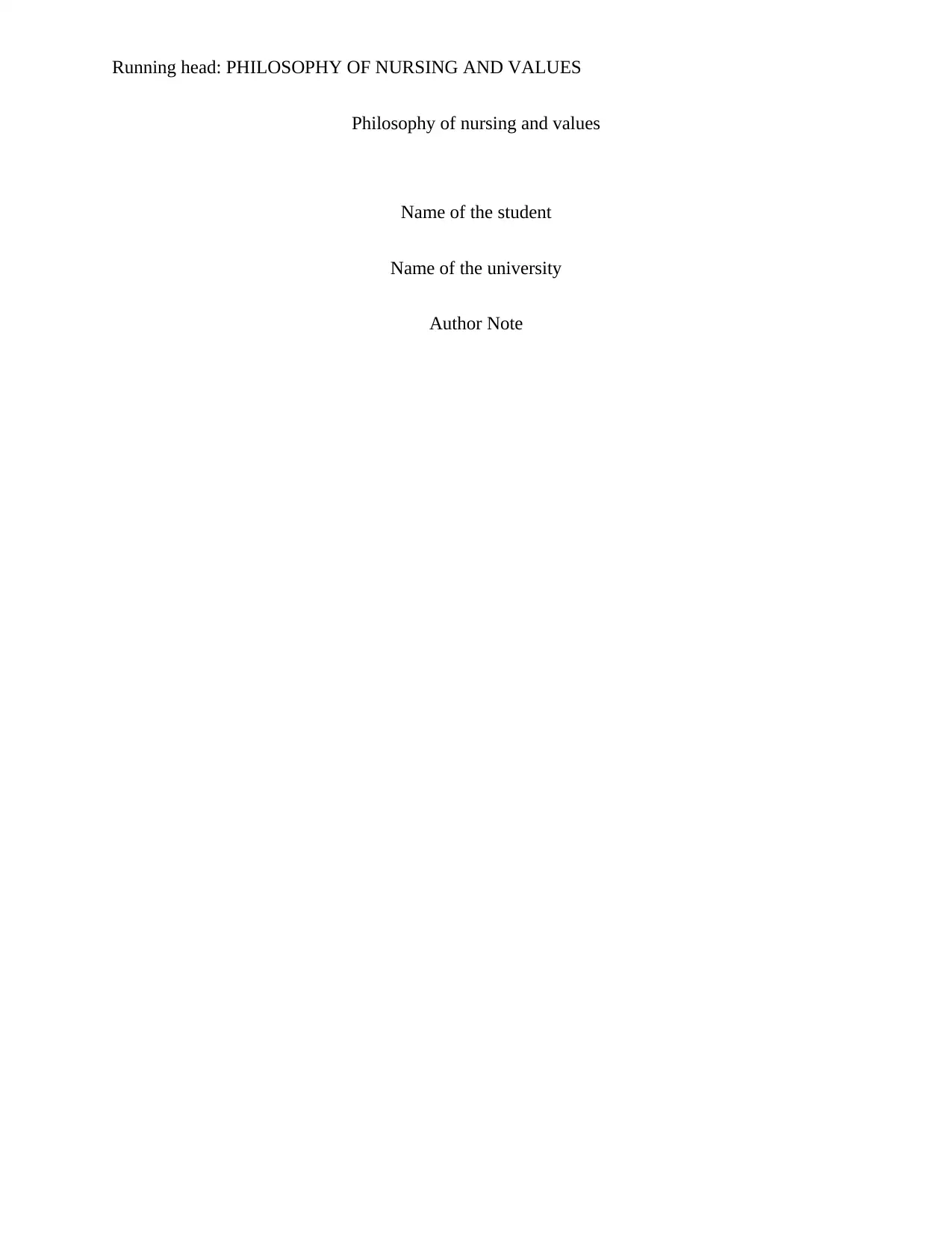
Running head: PHILOSOPHY OF NURSING AND VALUES
Philosophy of nursing and values
Name of the student
Name of the university
Author Note
Philosophy of nursing and values
Name of the student
Name of the university
Author Note
Paraphrase This Document
Need a fresh take? Get an instant paraphrase of this document with our AI Paraphraser
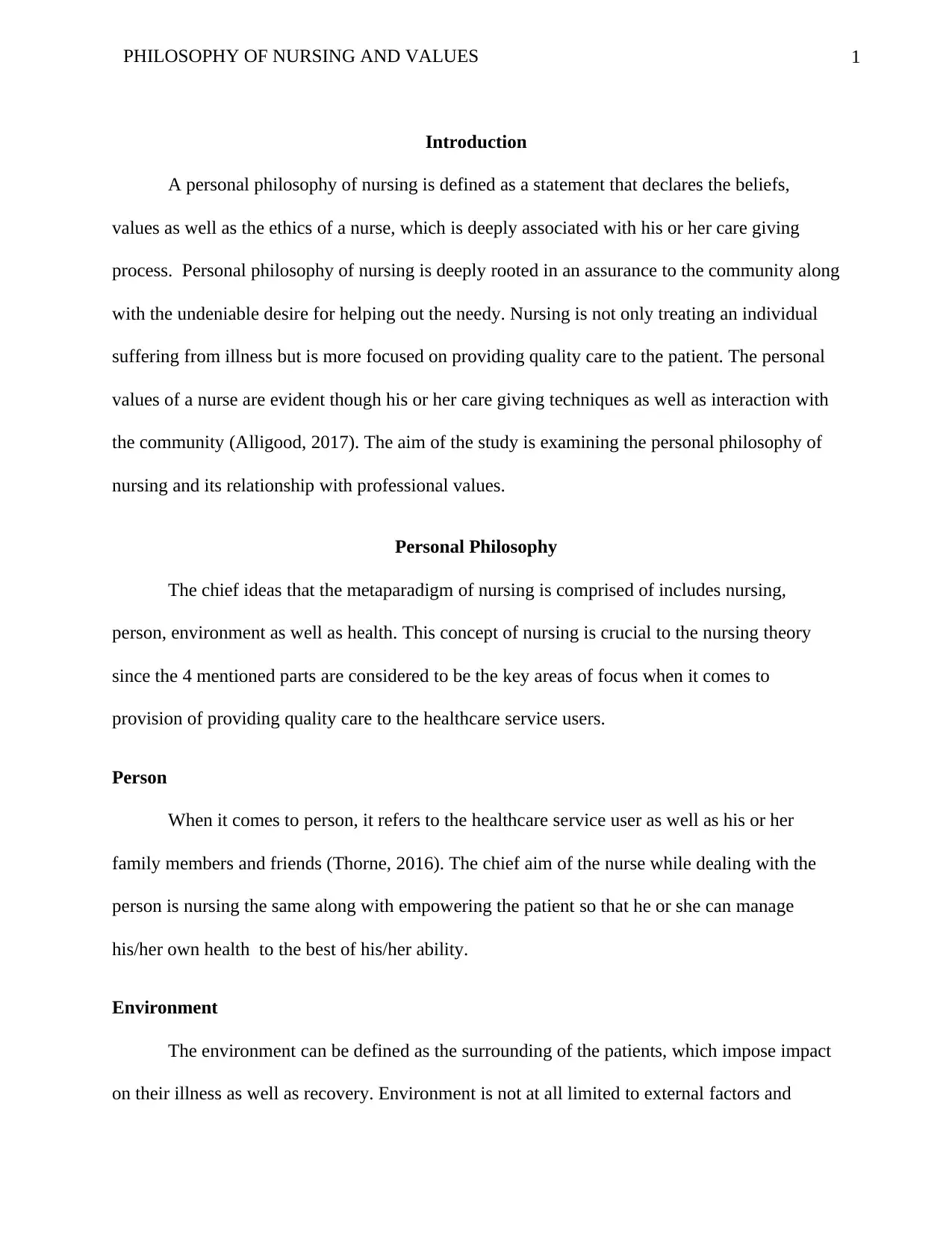
1PHILOSOPHY OF NURSING AND VALUES
Introduction
A personal philosophy of nursing is defined as a statement that declares the beliefs,
values as well as the ethics of a nurse, which is deeply associated with his or her care giving
process. Personal philosophy of nursing is deeply rooted in an assurance to the community along
with the undeniable desire for helping out the needy. Nursing is not only treating an individual
suffering from illness but is more focused on providing quality care to the patient. The personal
values of a nurse are evident though his or her care giving techniques as well as interaction with
the community (Alligood, 2017). The aim of the study is examining the personal philosophy of
nursing and its relationship with professional values.
Personal Philosophy
The chief ideas that the metaparadigm of nursing is comprised of includes nursing,
person, environment as well as health. This concept of nursing is crucial to the nursing theory
since the 4 mentioned parts are considered to be the key areas of focus when it comes to
provision of providing quality care to the healthcare service users.
Person
When it comes to person, it refers to the healthcare service user as well as his or her
family members and friends (Thorne, 2016). The chief aim of the nurse while dealing with the
person is nursing the same along with empowering the patient so that he or she can manage
his/her own health to the best of his/her ability.
Environment
The environment can be defined as the surrounding of the patients, which impose impact
on their illness as well as recovery. Environment is not at all limited to external factors and
Introduction
A personal philosophy of nursing is defined as a statement that declares the beliefs,
values as well as the ethics of a nurse, which is deeply associated with his or her care giving
process. Personal philosophy of nursing is deeply rooted in an assurance to the community along
with the undeniable desire for helping out the needy. Nursing is not only treating an individual
suffering from illness but is more focused on providing quality care to the patient. The personal
values of a nurse are evident though his or her care giving techniques as well as interaction with
the community (Alligood, 2017). The aim of the study is examining the personal philosophy of
nursing and its relationship with professional values.
Personal Philosophy
The chief ideas that the metaparadigm of nursing is comprised of includes nursing,
person, environment as well as health. This concept of nursing is crucial to the nursing theory
since the 4 mentioned parts are considered to be the key areas of focus when it comes to
provision of providing quality care to the healthcare service users.
Person
When it comes to person, it refers to the healthcare service user as well as his or her
family members and friends (Thorne, 2016). The chief aim of the nurse while dealing with the
person is nursing the same along with empowering the patient so that he or she can manage
his/her own health to the best of his/her ability.
Environment
The environment can be defined as the surrounding of the patients, which impose impact
on their illness as well as recovery. Environment is not at all limited to external factors and
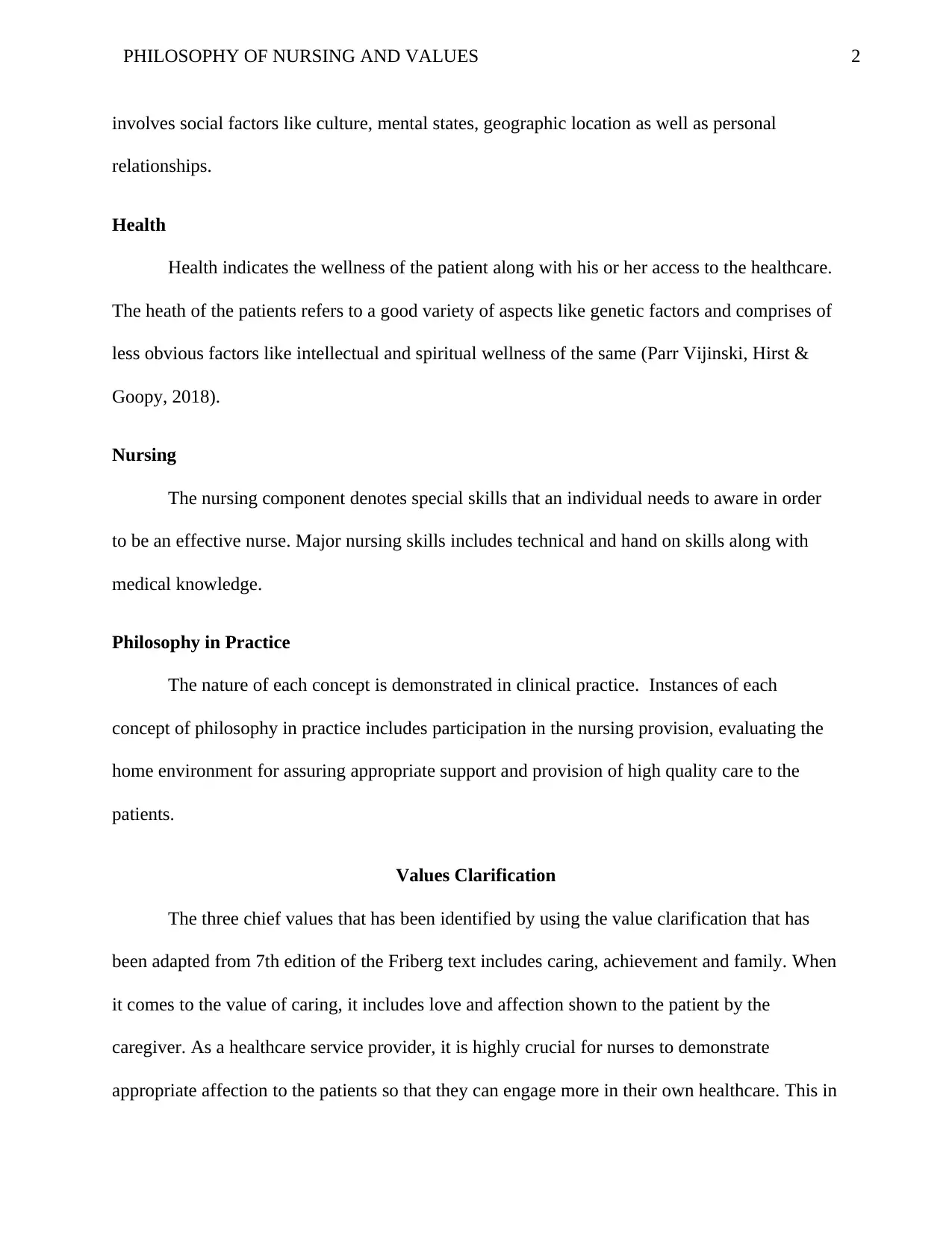
2PHILOSOPHY OF NURSING AND VALUES
involves social factors like culture, mental states, geographic location as well as personal
relationships.
Health
Health indicates the wellness of the patient along with his or her access to the healthcare.
The heath of the patients refers to a good variety of aspects like genetic factors and comprises of
less obvious factors like intellectual and spiritual wellness of the same (Parr Vijinski, Hirst &
Goopy, 2018).
Nursing
The nursing component denotes special skills that an individual needs to aware in order
to be an effective nurse. Major nursing skills includes technical and hand on skills along with
medical knowledge.
Philosophy in Practice
The nature of each concept is demonstrated in clinical practice. Instances of each
concept of philosophy in practice includes participation in the nursing provision, evaluating the
home environment for assuring appropriate support and provision of high quality care to the
patients.
Values Clarification
The three chief values that has been identified by using the value clarification that has
been adapted from 7th edition of the Friberg text includes caring, achievement and family. When
it comes to the value of caring, it includes love and affection shown to the patient by the
caregiver. As a healthcare service provider, it is highly crucial for nurses to demonstrate
appropriate affection to the patients so that they can engage more in their own healthcare. This in
involves social factors like culture, mental states, geographic location as well as personal
relationships.
Health
Health indicates the wellness of the patient along with his or her access to the healthcare.
The heath of the patients refers to a good variety of aspects like genetic factors and comprises of
less obvious factors like intellectual and spiritual wellness of the same (Parr Vijinski, Hirst &
Goopy, 2018).
Nursing
The nursing component denotes special skills that an individual needs to aware in order
to be an effective nurse. Major nursing skills includes technical and hand on skills along with
medical knowledge.
Philosophy in Practice
The nature of each concept is demonstrated in clinical practice. Instances of each
concept of philosophy in practice includes participation in the nursing provision, evaluating the
home environment for assuring appropriate support and provision of high quality care to the
patients.
Values Clarification
The three chief values that has been identified by using the value clarification that has
been adapted from 7th edition of the Friberg text includes caring, achievement and family. When
it comes to the value of caring, it includes love and affection shown to the patient by the
caregiver. As a healthcare service provider, it is highly crucial for nurses to demonstrate
appropriate affection to the patients so that they can engage more in their own healthcare. This in
⊘ This is a preview!⊘
Do you want full access?
Subscribe today to unlock all pages.

Trusted by 1+ million students worldwide
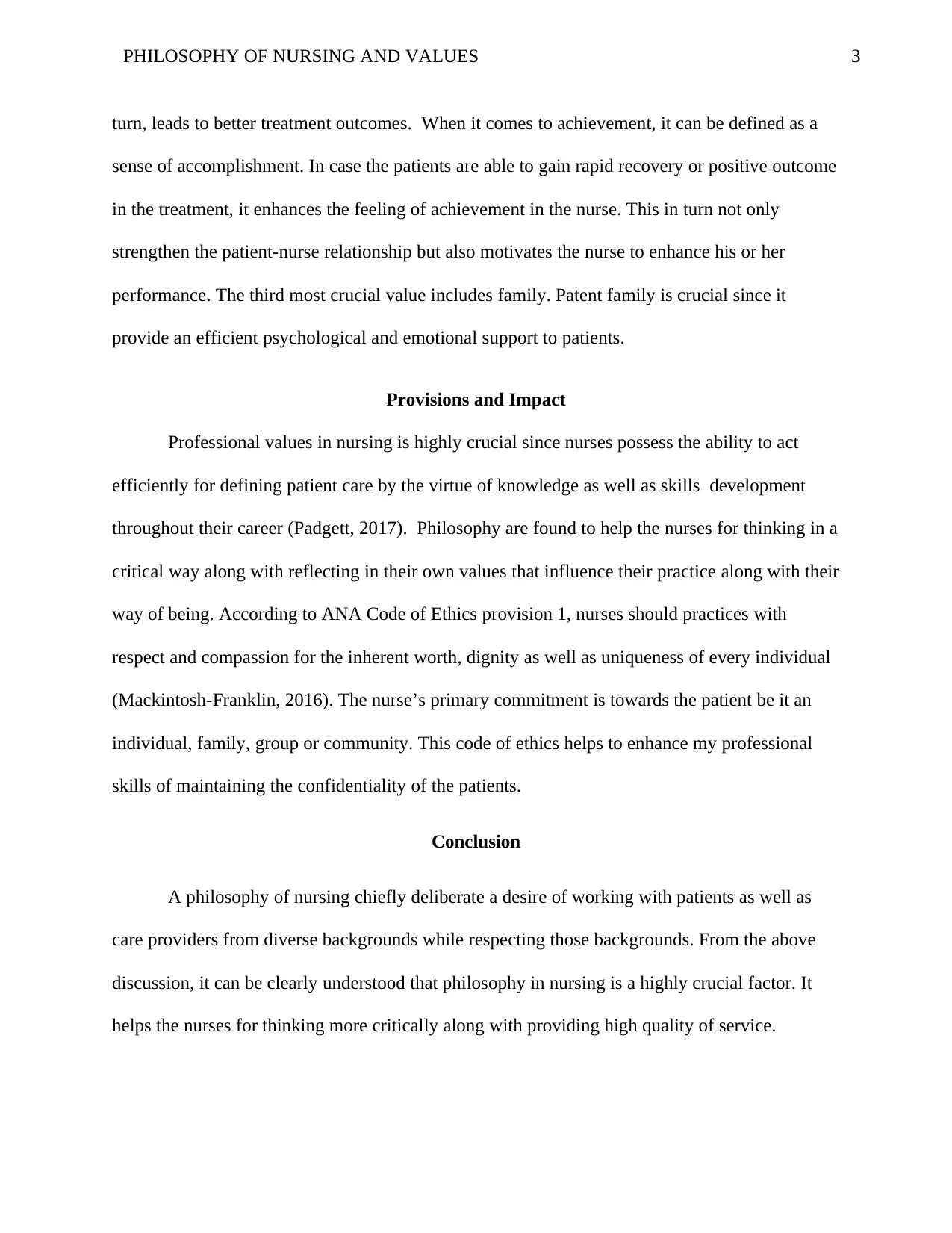
3PHILOSOPHY OF NURSING AND VALUES
turn, leads to better treatment outcomes. When it comes to achievement, it can be defined as a
sense of accomplishment. In case the patients are able to gain rapid recovery or positive outcome
in the treatment, it enhances the feeling of achievement in the nurse. This in turn not only
strengthen the patient-nurse relationship but also motivates the nurse to enhance his or her
performance. The third most crucial value includes family. Patent family is crucial since it
provide an efficient psychological and emotional support to patients.
Provisions and Impact
Professional values in nursing is highly crucial since nurses possess the ability to act
efficiently for defining patient care by the virtue of knowledge as well as skills development
throughout their career (Padgett, 2017). Philosophy are found to help the nurses for thinking in a
critical way along with reflecting in their own values that influence their practice along with their
way of being. According to ANA Code of Ethics provision 1, nurses should practices with
respect and compassion for the inherent worth, dignity as well as uniqueness of every individual
(Mackintosh-Franklin, 2016). The nurse’s primary commitment is towards the patient be it an
individual, family, group or community. This code of ethics helps to enhance my professional
skills of maintaining the confidentiality of the patients.
Conclusion
A philosophy of nursing chiefly deliberate a desire of working with patients as well as
care providers from diverse backgrounds while respecting those backgrounds. From the above
discussion, it can be clearly understood that philosophy in nursing is a highly crucial factor. It
helps the nurses for thinking more critically along with providing high quality of service.
turn, leads to better treatment outcomes. When it comes to achievement, it can be defined as a
sense of accomplishment. In case the patients are able to gain rapid recovery or positive outcome
in the treatment, it enhances the feeling of achievement in the nurse. This in turn not only
strengthen the patient-nurse relationship but also motivates the nurse to enhance his or her
performance. The third most crucial value includes family. Patent family is crucial since it
provide an efficient psychological and emotional support to patients.
Provisions and Impact
Professional values in nursing is highly crucial since nurses possess the ability to act
efficiently for defining patient care by the virtue of knowledge as well as skills development
throughout their career (Padgett, 2017). Philosophy are found to help the nurses for thinking in a
critical way along with reflecting in their own values that influence their practice along with their
way of being. According to ANA Code of Ethics provision 1, nurses should practices with
respect and compassion for the inherent worth, dignity as well as uniqueness of every individual
(Mackintosh-Franklin, 2016). The nurse’s primary commitment is towards the patient be it an
individual, family, group or community. This code of ethics helps to enhance my professional
skills of maintaining the confidentiality of the patients.
Conclusion
A philosophy of nursing chiefly deliberate a desire of working with patients as well as
care providers from diverse backgrounds while respecting those backgrounds. From the above
discussion, it can be clearly understood that philosophy in nursing is a highly crucial factor. It
helps the nurses for thinking more critically along with providing high quality of service.
Paraphrase This Document
Need a fresh take? Get an instant paraphrase of this document with our AI Paraphraser
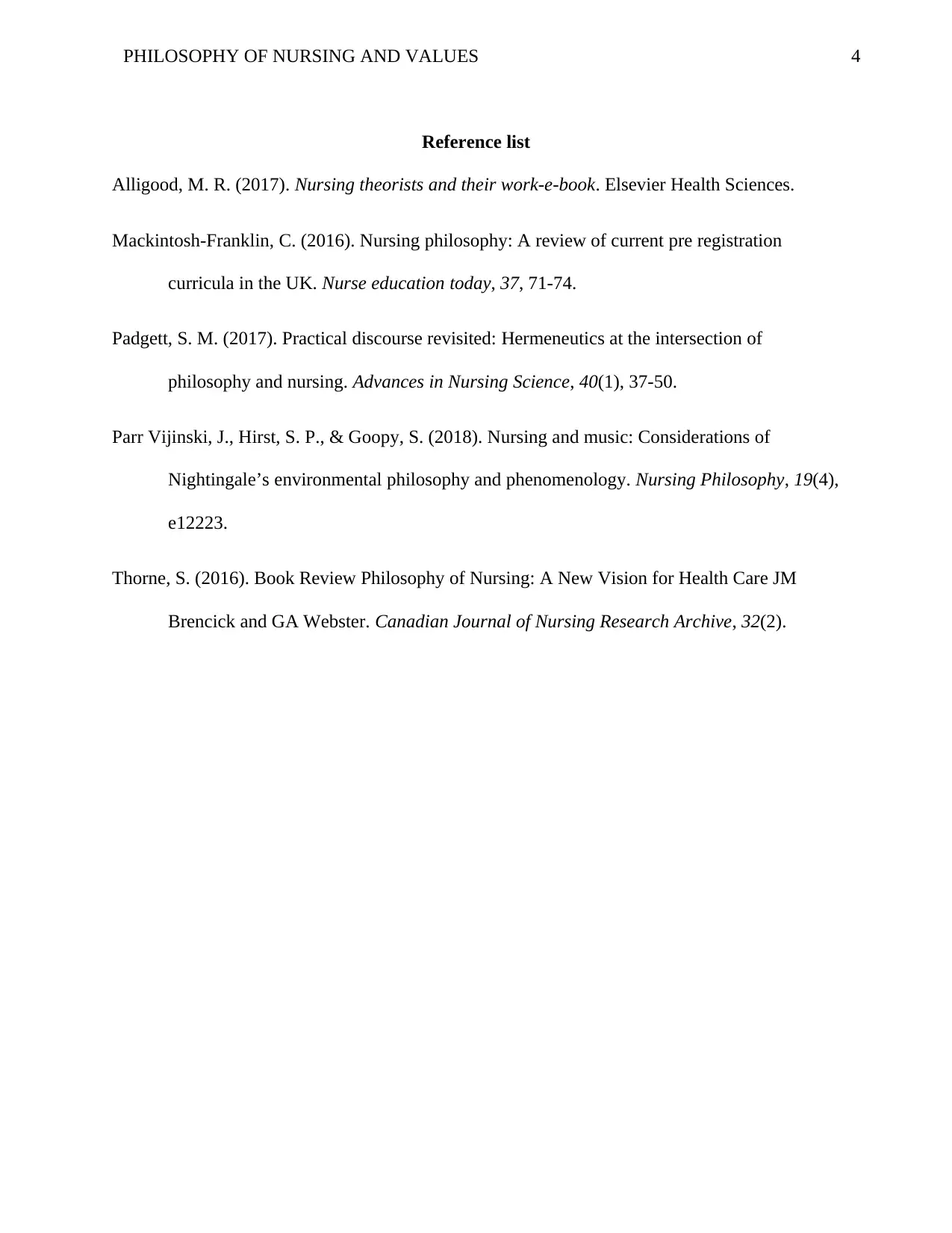
4PHILOSOPHY OF NURSING AND VALUES
Reference list
Alligood, M. R. (2017). Nursing theorists and their work-e-book. Elsevier Health Sciences.
Mackintosh-Franklin, C. (2016). Nursing philosophy: A review of current pre registration
curricula in the UK. Nurse education today, 37, 71-74.
Padgett, S. M. (2017). Practical discourse revisited: Hermeneutics at the intersection of
philosophy and nursing. Advances in Nursing Science, 40(1), 37-50.
Parr Vijinski, J., Hirst, S. P., & Goopy, S. (2018). Nursing and music: Considerations of
Nightingale’s environmental philosophy and phenomenology. Nursing Philosophy, 19(4),
e12223.
Thorne, S. (2016). Book Review Philosophy of Nursing: A New Vision for Health Care JM
Brencick and GA Webster. Canadian Journal of Nursing Research Archive, 32(2).
Reference list
Alligood, M. R. (2017). Nursing theorists and their work-e-book. Elsevier Health Sciences.
Mackintosh-Franklin, C. (2016). Nursing philosophy: A review of current pre registration
curricula in the UK. Nurse education today, 37, 71-74.
Padgett, S. M. (2017). Practical discourse revisited: Hermeneutics at the intersection of
philosophy and nursing. Advances in Nursing Science, 40(1), 37-50.
Parr Vijinski, J., Hirst, S. P., & Goopy, S. (2018). Nursing and music: Considerations of
Nightingale’s environmental philosophy and phenomenology. Nursing Philosophy, 19(4),
e12223.
Thorne, S. (2016). Book Review Philosophy of Nursing: A New Vision for Health Care JM
Brencick and GA Webster. Canadian Journal of Nursing Research Archive, 32(2).
1 out of 5
Related Documents
Your All-in-One AI-Powered Toolkit for Academic Success.
+13062052269
info@desklib.com
Available 24*7 on WhatsApp / Email
![[object Object]](/_next/static/media/star-bottom.7253800d.svg)
Unlock your academic potential
Copyright © 2020–2026 A2Z Services. All Rights Reserved. Developed and managed by ZUCOL.




